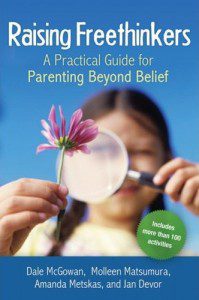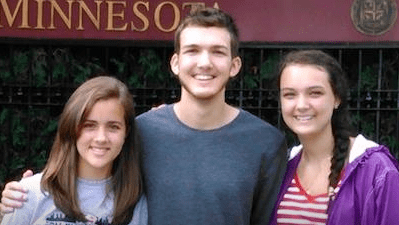After 20 years as a parent, I’ve learned that the phrase “I’m not a parent myself, but…” is a clear signal that I should not just take the next few words with a grain of salt, but bludgeon them with Lot’s wife.
Many atheist non-parents over the years have said to me, with great confidence, “I’m not a parent myself, but atheists should definitely raise their children as atheists. Just tell them that God is pretend and be done with it!” The alternative, I’m told, is to privilege religion “as true,” or to be “neutral” on the question. (Sometimes atheist parents say the same, but much less often in my experience.)
I don’t call religion “true,” and I don’t pretend to be neutral on the question — and I haven’t raised my kids as atheists. Fortunately, there’s yet another way, and it’s awesome: Teach your kids to think critically and to love reality, then turn them loose on every hypothesis about the world they live in. Every one.
When a fellow Patheos blogger asked rhetorically, “should I ‘let my children decide’ whether JFK was not actually killed by Oswald or whether the moon landing was faked or whether 9/11 was an inside job?”, I thought, Why wouldn’t you? The alternative to “letting them decide” is not letting them decide. The alternative is handing them packages of truth that we have tied up for them, saying, “No need to do all that thinking. I’ve done it for you.”
No, I’m not saying, “Gee, who am I to say what’s really true?” These aren’t hard to figure out. In fact, my confidence in the answers is so formidable that I can trust anyone who has both the critical tools and a love of reality to find those conclusions themselves — and in the process, to know WHY they are true, which sends their confidence in those conclusions through the roof. If someone else figured out the “why” for them, their confidence would be based only on their relationship to that person as a source.
Of course for all their historical importance, Kennedy’s death and the moon landing and what made the Twin Towers fall are less crucial to know than a lot of other things. That vaccinations are good, for example. That human action created global warming. That race and gender are irrelevant in judging a person’s character, intelligence, or ability. These are things that really, really matter…so I have to hand these to the kids as tied-up packages, right?
Sure. If I want their confidence in those vital conclusions to rest on my authority, then sure.
If instead you’re serious about putting a firm foundation under their conclusions about important things, then give them the tools and set them free — because these things are important.
This doesn’t mean I have to pretend to be without an opinion on these things. I’m just one source among many. I share my opinions openly, and I give my reasons for them. But then I specifically urge them to decide for themselves, not because I’m under-confident, and not because I think it’s unimportant, but because I’m hugely confident and it’s hugely important.
My kids don’t think racism is bullshit because I said it is — they think it’s bullshit because they actively sought out the (weak) pro-racism arguments through the years and discovered that oh hey, it’s bullshit. They don’t just know it is, they know why. And they know why vaccinations are good and why global warming is human-made because they cared enough to do the heavy lifting themselves. The result is opinions with staying power.
Which brings us to religion.
I had the lucky circumstance of parents who encouraged me to think for myself and to find the world wonderful enough to know on its own terms. So I dug into the big questions, including God and religion. No one handled me settled answers either way, so I had to dig in and find out for myself. Lo and behold, I found out it’s all nonsense, because that’s what you find out when you actually try.
Because I did it all myself, I’m standing on a foundation of incredible strength. I know every brick in that foundation because I put it there myself. When someone challenges my opinions, I can be relaxed and confident because I know exactly why I hold them. It’s an incredibly satisfying feeling to have done that myself. Why would I deny my kids that feeling?
If someone had merely informed me that God and religion were nonsense, handed me a tied-up package, I could have mumbled, “Okay, thanks” — and my foundation would be Swiss cheese. Why would I put my kids in that position?
I’m an atheist, but atheism is not at the heart of my parenting — freethought is. My kids know my religious views, and I know my opinion will carry more weight than others. So I’ve always gone to great lengths to counter that undue influence, not because I think I’m wrong, but to preserve their autonomy so they can make up their minds independently in the long run and own that process.
When Erin (then 9, now 16) came to me and asked, “Did Jesus really come alive after he was dead?”, I said, “I don’t think so, no. I think that’s just a story that was made up so we feel better about death.” And I told her why I thought that. “But talk to Grandma Barbara. I know she thinks it really happened. And then you can ask why she thinks that, then make up your own mind and even change your mind back and forth a thousand times if you want.” Even more helpful was the fact that my wife was religious for most of their childhood, and smart, and devoted to the same free process. We had the defense and prosecution for every religious idea under the same roof so the kids could be the judges.
My kids took this freedom and ran with it — especially Delaney, who was constantly trying on the glasses of various worldviews as she grew up. She was a fairly conventional New Testament Christian for a while, then became something of a Manichaean dualist, believing the world was divided into good and evil, darkness and light. She eventually went through a sort of Einsteinian-pantheist phase before adopting a benevolent, utilitarian humanism.
And then she turned six.
I always encouraged my kids to try on as many beliefs as they wanted and to switch back and forth whenever they felt drawn toward a different hat, confident that in the long run they would be better informed not only of the identity they choose but of those they declined.
As of now, all three are secular. Two have decided they are atheists, and the other prefers agnostic. And because they built their worldviews themselves, their opinions are relaxed and confident, with great nuance and empathy — all things they might have lacked if I simply told them what to believe.
Other Patheos Atheists on this topic:
Why I Will Teach My Children that Religion is Nonsense at On the Margin of Error
Why I Won’t Teach My Children that Religion is Nonsense at Love, Joy, Feminism
Is It Possible to be Neutral When Talking About Religion? at Natural Wonderers
Should Atheist Parents Set Out to Raise Atheists? at Camels With Hammers
















